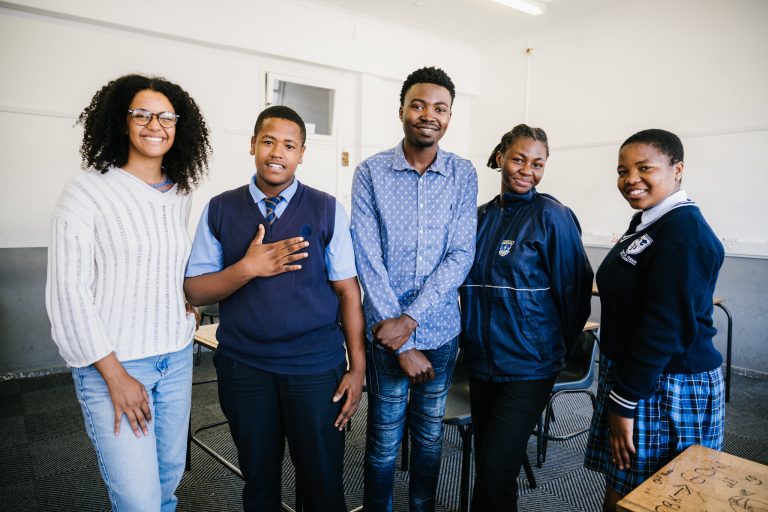RESOURCES
2024-05-14
What to Do After High School
Discover post-high school options and career paths with our expert advice. Plan your future today!
Published by Tilting Futures

As you approach the end of your high school journey, the question of what comes next looms large. The decisions you make now can shape your career, personal growth, and overall life trajectory. Whether you are pursuing higher education, stepping into the workforce, exploring vocational training, or taking a gap year, each option offers unique opportunities and experiences.
Exploring Higher Education
For many people, traditional higher education is a natural answer for what to do after high school. This path offers an opportunity to delve deeper into academic subjects, gain specialized knowledge, and prepare for specific careers.
Pursuing a Bachelor’s Degree
This degree requires 4 years of school where you select a major or field of study. You can take career aptitude tests or speak with a career counselor to figure out what major is best for you if you are currently unsure. As you consider a major, it’s wise to look at market trends and understand the demand for different fields or job prospects. Also, research colleges and universities, especially so that they align with your interests and degree preferences!
Associate’s Degrees and Community Colleges
A bachelor’s degree is a great option, but you can also start with a 2-year associate’s degree. There are several benefits to starting at a community college to get your associate degree, including cost-effectiveness, smaller class sizes, flexibility, and career exploration. Look for community colleges with articulation agreements that guarantee credit transfer to four-year institutions—don’t be afraid to connect with academic advisors to ensure this goes off without a hitch.
Trade Schools and Vocational Training
Trade schools offer focused training in specific trades like automotive technology, plumbing, electrical work, culinary arts, and more. Programs are typically shorter than traditional college degrees, often taking less than two years to complete. Many trades are in high demand and offer stable job prospects since you can often start working immediately after graduating.
Entering the Workforce
Many students don’t want a classroom education, so when figuring out what to do after high school, they want to jump right into the workforce. While a degree can make you more marketable, getting experience at a job is also incredibly valuable. Here are some factors to consider.
Resume Building and Job Search
Finding a good fit for yourself, especially right outside of high school when you have limited experience, can be a bit intimidating. To begin exploring, you can focus on networking, going to job fairs and recruitment events, and regularly checking job boards and apps like Glassdoor and Indeed. Do yourself a favor and create a compelling and focused resume. You can find a free template that hits key areas like relevant skills or school projects and any previous work or volunteer experience
Apprenticeships and Internships
Many organizations offer apprenticeships and internships that give you hands-on experience. Some of them are even paid, and many can lead to full-time positions, too. Apprenticeships are programs that combine on-the-job training with classroom instruction, often in skilled trades. Internships offer a chance to work in a professional environment, usually related to your career interests, and can sometimes lead to full-time positions.
Not only can they lead to long-term career prospects, but you also have access to real-world mentorship, which can make all the difference for professional growth and industry-specific development.
Entrepreneurship and Starting a Business
If you’re interested in starting your own business, you’re in for a challenging but rewarding journey. You’ll need to develop a solid business idea with a detailed business plan that outlines your strategy, market analysis, and financial projections. Decide on a legal structure (e.g., sole proprietorship, LLC) and register your business as required. From there, you can explore funding options, including savings, loans, or investors.
Gap Year Options
Taking a gap year offers a unique opportunity for personal growth, exploration, and gaining new perspectives. It’s an especially fitting option if you’re still exploring what you want to do career-wise. Here are some options to consider.
Volunteering and Nonprofit Work
Volunteering during a gap year offers diverse opportunities, from local community service to international NGO work. Engaging in areas like education, health, or environmental conservation not only contributes to personal growth and skill development but also makes a significant impact on the communities served. This experience fosters empathy and self-awareness while developing leadership and problem-solving skills.
Traveling and Cultural Experiences
Traveling during a gap year is a journey of cultural immersion and broadening perspectives. It’s an educational adventure that enhances cultural understanding and tolerance. Planning is crucial, involving budgeting for travel costs and managing visa requirements. This experience not only exposes one to new cultures and languages but also helps in understanding global issues.
Personal Development and Skill Building
A gap year is also an excellent time for personal development and learning new skills. Whether it’s improving language proficiency in a foreign country or acquiring practical skills like cooking or diving, the experience is enriching.
Your gap year can actually be a blend of volunteering, travel, and personal development. Immersive learning programs like Take Action Lab are designed to offer a structured yet flexible experience that encompasses all these elements. They provide opportunities for cultural immersion, skill-building, and making a meaningful impact while allowing you to tailor the experience to your personal goals and interests.

Considering a gap year after high school?
See how Take Action Lab could align with your goals.
Military Service
You can also join the military after high school, which presents many unique benefits and some important considerations. Here is a breakdown of the basics.
Joining the Armed Forces
Joining the military is a significant decision that offers a unique blend of challenges and rewards. The U.S. Armed Forces consist of five branches: the Army, Navy, Air Force, Marine Corps, and Coast Guard, each with its distinct role in national defense.
Military service provides numerous benefits, including educational opportunities through the GI Bill, specialized training, healthcare, and a sense of camaraderie and purpose. It also instills discipline, leadership skills, and a strong work ethic, which are valuable in both military and civilian life.
Reserve and National Guard Options
For those seeking to serve their country while maintaining a civilian career, the Reserve and National Guard offer an ideal balance. These part-time service options allow individuals to train near home and serve one weekend a month plus two weeks a year.
Members of the Reserve and National Guard play a crucial role in national defense and disaster response, all while pursuing their civilian careers or education. This path provides the opportunity to gain military experience and benefits, including education assistance and retirement benefits, without committing to full-time active duty.
Financial Planning
Understanding College Costs
College costs encompass more than just tuition; they include fees, textbooks, living expenses, and possibly travel. To navigate these expenses, students should explore financial aid options like FAFSA and scholarships. Completing the Free Application for Federal Student Aid (FAFSA) is a critical step, as it determines eligibility for federal grants and loans.
Budgeting for Independent Living
Transitioning to independent living also requires sound financial management. This involves creating a budget plan that accounts for all expenses, including rent, utilities, groceries, transportation, and personal expenses. It’s also important to consider saving for emergencies and future goals.
Student Loans and Repayment
Student loans are a common method to finance higher education, but it’s important to understand the different types available. Federal student loans typically offer more favorable terms and protections compared to private loans. Then you can explore repayment plans based on income, consider loan consolidation, or look into loan forgiveness programs for certain professions.
Essential Skills To Develop After High School
No matter what path you choose, you want to develop certain skills for a fulfilling and successful future. These basic skills can take you far:
- Technical Skills: These are specific to your chosen career path and are fundamental for job proficiency. Whether it’s coding for a tech job, writing for journalism, or drawing for design, these skills are directly related to your ability to perform specific tasks and are often developed through specialized education and training.
- Soft Skills: Universally valued across all professions, these skills play a critical role in how you interact and collaborate with others. They include skills like effective communication, problem-solving, teamwork, leadership, time management, and organizational skills.
- Life Skills: These traits are the bedrock of daily living and encompass a broad range of competencies. They include budgeting and financial literacy, cooking and basic home repairs, maintaining a clean living space, and living a healthy lifestyle.
Confidently Move Forward with Take Action Lab
For many students, the key to finding what to do after high school is to embrace continuous learning. This growth can occur in the classroom or across the world; it’s all about your aspirations, needs, and opportunities.
Whether you want to dive right into the workforce, gain experience, or get a degree, an immersive semester abroad is an excellent next step after graduation. Not only do you get to bulk up your resume with unique and life-changing experiences, but you’ll also experience a lot of personal development, clarity on your future, and a diverse set of skills. Request more info today to learn more!


